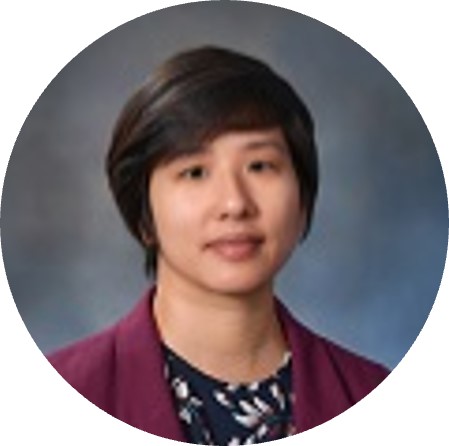MIRECC / CoE
Newsletter | Summer 2023 Article 2 | South Central MIRECC
Meet the SC MIRECC Researcher: Patricia Chen, PhD

Q. Please tell us a bit about your educational and career background.
I received my doctorate in sociology from the University of Michigan in 2017. I moved to Houston in 2018 and joined the HSR&D Center of Innovations in Quality, Effectiveness and Safety (IQuESt) in August 2019 as a qualitative methodologist.
Q. What do you like about doing research with Veterans?
I feel lucky that I get to interview Veterans. It helps to keep me grounded and connected to the people whom we are studying and serving. I like hearing their stories and getting a glimpse of their personalities and lives. It's always great to hear that a program or treatment the VA or the Center is providing has been meaningful to or impacted Veterans in some way. It centers the work and gives the research real purpose for me.
Q. Do you have any ongoing or upcoming studies or projects that you want to highlight?
I work with Jan Lindsay on her projects related digital mental health innovations, Terri Fletcher on projects related to anxiety treatment and diagnosing, Barbara Trautner on projects related to antibiotic stewardship, and Nader Massarweh on his VA surgical quality improvement project. I also work some on Drew Helmer's projects related to lung cancer treatment for Veterans. They all have great projects and are wonderful people to work with. I do different things depending on what’s needed, whether it be interviewing participants, analyzing data, writing papers, or helping to draft qualitative research plans.
Q. Are there any people who have played important roles in your professional development that you would like to mention?
So many! First, Jan Lindsay for giving me so many opportunities to write and lead, and also for telling me early on what my worth was. She is also a great advocate for qualitative methods. Watching her as a project leader, I have always admired how authentic and real she is, and the energy she brings to meetings.
Also, Amy Amspoker and Shubhada Sansgiry have given me a lot of great advice over the years, shared their own stories, and have been the pioneers paving the way for the rest of us in the Methods and Analytics Core. Especially Amy, who was the first person to say, "Hey you should go for that." It always meant a lot to have her see and encourage me.
Kyler Godwin is smart as a whip. I remember her saying, “Sometimes you give people advice and just have to be ready to let them take it or leave it without being too attached to the outcome.” I believe "decathect" (Lindsay) is the clinical term, and I try to remember this all the time.
Finally, early on when I was planning and designing qualitative workshops, Jessica Davila told me, "You should do something that you want to do; a class that you would be excited to teach." It was mind-blowing and gave me the freedom to move and do it. I'll always be grateful for that piece of wisdom.
Q. How will you use your SC MIRECC affiliation to grow your research career?
A previous advisor told me, “In order for people to grow, they need safe spaces in which to fail.” The SC MIRECC projects I've worked on have always been really safe places. I credit my project leaders for creating these kinds of environments on their teams. These are projects where I can ask questions, and don't have to act like I know everything. But at the same time, there is a trust there, and a sense that they value what I can contribute, which is encouraging. It has also made me want to approach things with a level of rigor, maybe as a way to reciprocate that trust or maybe so I can continue earning it. Looking back (and even now), I see I've been given a lot of latitude to try new things, be wrong, learn, get better – because of the safe spaces that SC MIRECC projects create.
Q. What would your dream program or research study be if funding weren’t an issue?
I would like to pilot a program that increases the amount of personnel in public health clinics to help people access health care coverage. This program would need people with administrative expertise and people skills, which would likely make it costly. The personnel would help people fill out forms and submit paperwork on time, as well as send them reminders and access the internet. If these tasks are normally the function of social workers, perhaps we could pilot getting more in clinics and increasing their pay. The research question could be, “If we do this, would we see more people using primary care and preventative services, and what health outcomes might this impact?”
Q. How can people get in touch with you if they have questions?
They can reach me at patricic@bcm.edu.
Last updated: July 25, 2023
In this Issue
— MIDAS for Active Projects
— Meet the Researcher
— CBOC MH Rounds Recordings in TMS
— Consumer Advocacy Board
— DEI Brief Guide
— DEI Calendar of Events
— Anchor Site Highlights
— New Clinical Education Resource
— Publication Highlights
— Pilot Grant Opportunity
SC MIRECC Menu
Home
About
Leadership & Staff
Anchor Sites
Research
Research Training
Houston Fellowship
Little Rock Fellowship
Fellows
Grant Writing
Education
CBOC Grand Rounds
BEST Program
Education Products
New and Featured
Products by Topic
Order
Clinical Care
Newsletter
News Flash
PACERS
Diversity (DEI)
Black Veterans
Older Veterans
Women Veterans



















